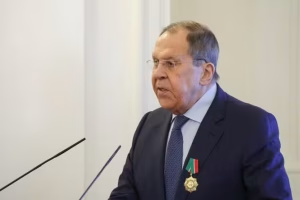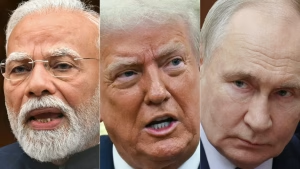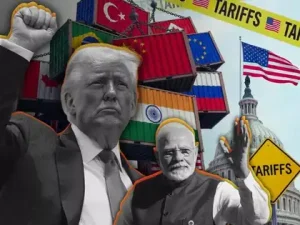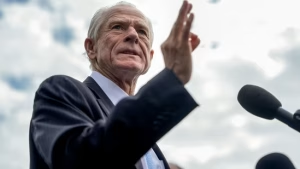Russia – Russian Foreign Minister Sergei Lavrov has delivered a strong rebuke to the United States regarding the Trump tariffs Russia policy, specifically criticizing American attempts to use economic coercion against India and China. Speaking on Russia’s main Channel 1 TV during ‘The Great Game’ programme, Lavrov argued that “ancient civilizations” like India and China will not succumb to ultimatums from Washington.
The Russian diplomat’s comments directly address the escalating trade tensions stemming from the Trump tariffs Russia approach, which has seen the US impose punitive measures on countries continuing to purchase Russian energy despite ongoing conflicts. Lavrov’s statement represents a significant diplomatic pushback against American economic pressure tactics.
Ancient Civilizations Resist Economic Coercion

Lavrov emphasized that the Trump tariffs Russia strategy fundamentally misunderstands the nature of established nations like India and China. “Both China and India are ancient civilisations, and to use this language with them, ‘either stop doing what I don’t like, or I will impose tariffs on you’ well, that won’t work,” he stated, highlighting the cultural and historical depth that influences these nations’ decision-making processes.
The Russian Foreign Minister’s critique of the Trump tariffs Russia policy suggests that Washington’s approach demonstrates a lack of appreciation for the sovereignty and historical resilience of major Asian powers. His comments indicate that such ultimatum-based diplomacy creates “moral and political” opposition rather than compliance.
Economic Impact and Market Disruption

The Trump tariffs Russia policy has created significant economic disruptions, forcing affected nations to seek alternative solutions. Lavrov noted that US demands to halt Russian energy purchases are “forcing nations to look for new energy markets, new resources, and pay more,” highlighting the broader economic consequences of the sanctions regime.
According to Lavrov’s analysis, the Trump tariffs Russia approach undermines the economic well-being of targeted countries while creating serious difficulties that extend beyond immediate trade relationships. This policy forces affected nations to restructure their energy supply chains and accept higher costs, creating long-term economic inefficiencies.
India’s Specific Challenges Under Tariff Regime


The Trump tariffs Russia policy has particularly impacted India, with President Trump doubling import duties from 25% to 50% specifically to punish New Delhi for continuing Russian oil purchases. These measures took effect on August 27, representing one of the most significant trade penalties imposed by the current administration.
The escalation in the Trump tariffs Russia framework occurred despite ongoing negotiations between India and the United States for an interim trade deal. Initially, Trump announced 25% tariffs on Indian goods in July, but subsequently added another 25% specifically citing India’s continued imports of Russian oil.
White House Officials’ Aggressive Rhetoric

White House Trade Adviser Peter Navarro has been particularly vocal in supporting the Trump tariffs Russia policy through harsh criticism of India. He branded India the “maharaja of tariffs” and accused Indian elites of profiteering at the expense of local workers while funding Russian oil purchases.
Navarro’s statements supporting the Trump tariffs Russia approach include allegations that “Indian refiners were in bed with Russian refiners immediately after the invasion” and that India uses trade profits to buy Russian oil, which Russia then uses to purchase weapons. His comments reflect the administration’s frustration with India’s energy purchasing decisions.
Commerce Secretary’s Additional Pressure
US Commerce Secretary Howard Lutnick has reinforced the Trump tariffs Russia message through his own criticism of India’s trade policies. He remarked that “India brags about having 1.4 billion people but won’t buy even a small amount of American corn,” warning that New Delhi must lower duties or face difficulties in US business relationships.
These statements from senior officials demonstrate the coordinated nature of the Trump tariffs Russia strategy, which extends beyond energy purchases to encompass broader trade relationship restructuring demands.
Lavrov’s Assessment of Sanctions Evolution
Regarding the broader sanctions framework that includes the Trump tariffs Russia policy, Lavrov noted that “an enormous amount of sanctions, unprecedented for that period, were imposed during President Donald Trump’s first term.” He suggested that Russia has adapted to these measures over time.
The Russian Foreign Minister argued that under the Biden administration, sanctions became “a replacement for any diplomatic effort” with “no search for a compromise,” indicating that the Trump tariffs Russia approach represents a continuation of established patterns rather than a new diplomatic direction.
Diplomatic and Strategic Implications
Lavrov’s criticism of the Trump tariffs Russia policy highlights fundamental questions about the effectiveness of economic coercion in international relations. His emphasis on the historical resilience of “ancient civilizations” suggests that such approaches may strengthen rather than weaken targeted nations’ resolve to maintain independent foreign policy decisions.
The ongoing debate over the Trump tariffs Russia strategy reflects broader tensions about sovereignty, economic interdependence, and the limits of unilateral pressure in an increasingly multipolar world order.

